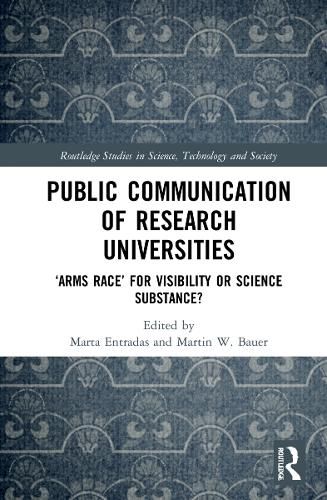Readings Newsletter
Become a Readings Member to make your shopping experience even easier.
Sign in or sign up for free!
You’re not far away from qualifying for FREE standard shipping within Australia
You’ve qualified for FREE standard shipping within Australia
The cart is loading…






This book analyses communication of university research institutes, with a focus on science communication. Advancing the 'decentralisation hypothesis', it asserts that communication structures are increasingly built also at 'subordinate unit' levels of research universities.
The book presents a cross-country systematic comparison of institutes' communication activities showing ongoing transformations in their communication capabilities and practices. It considers a potential 'arms race' in activities, professionalisation, motivations, and evaluation. Based on empirical evidence from an international study carried out in various countries across Europe, the Americas, and Asia, the book examines the possibilities for civic science communication in this new context.
It will be of interest to scholars and students of Communication Studies, STS, and Science Communication as well as to those taking or leading courses in the fields of Sociology, Public Relations, Marketing, Environmental and Risk Communication, Innovation Studies, and Social Psychology. It is an essential resource for funders, practitioners, teachers, and students dealing with science communication and the position of science in society.
$9.00 standard shipping within Australia
FREE standard shipping within Australia for orders over $100.00
Express & International shipping calculated at checkout
This book analyses communication of university research institutes, with a focus on science communication. Advancing the 'decentralisation hypothesis', it asserts that communication structures are increasingly built also at 'subordinate unit' levels of research universities.
The book presents a cross-country systematic comparison of institutes' communication activities showing ongoing transformations in their communication capabilities and practices. It considers a potential 'arms race' in activities, professionalisation, motivations, and evaluation. Based on empirical evidence from an international study carried out in various countries across Europe, the Americas, and Asia, the book examines the possibilities for civic science communication in this new context.
It will be of interest to scholars and students of Communication Studies, STS, and Science Communication as well as to those taking or leading courses in the fields of Sociology, Public Relations, Marketing, Environmental and Risk Communication, Innovation Studies, and Social Psychology. It is an essential resource for funders, practitioners, teachers, and students dealing with science communication and the position of science in society.